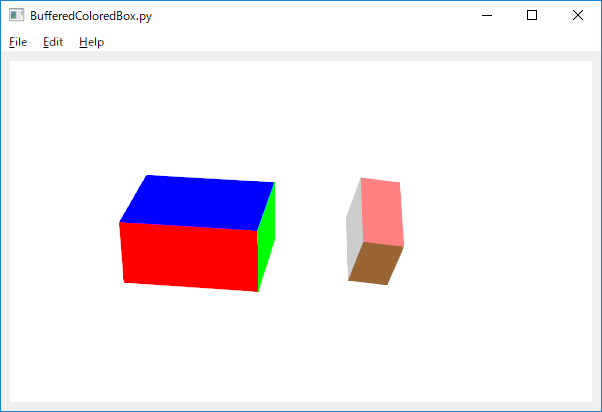|
SOL4Py Sample: BufferedColoredBox
|

#******************************************************************************
#
# Copyright (c) 2018-2019 Antillia.com TOSHIYUKI ARAI. ALL RIGHTS RESERVED.
#
# This program is free software: you can redistribute it and/or modify
# it under the terms of the GNU General Public License as published by
# the Free Software Foundation, either version 3 of the License, or
# (at your option) any later version.
#
# This program is distributed in the hope that it will be useful,
# but WITHOUT ANY WARRANTY; without even the implied warranty of
# MERCHANTABILITY or FITNESS FOR A PARTICULAR PURPOSE. See the
# GNU General Public License for more details.
#
# You should have received a copy of the GNU General Public License
# along with this program. If not, see <http://www.gnu.org/licenses/>.
#
#******************************************************************************
# BufferedColoredBox.py
# encoding: utf-8
import sys
import os
import traceback
import traceback
import numpy as np
import math
sys.path.append('../')
from PIL import Image, ImageOps
from SOL4Py.opengl.ZOpenGLMainView import *
from SOL4Py.opengl.ZOpenGLColoredBox import *
from SOL4Py.openglarb.ZOpenGLBufferedShape import *
class MainView(ZOpenGLMainView):
# Inner class starts.
class OpenGLView(ZOpenGLView):
## Constructor
def __init__(self, parent=None):
self.parent = parent
super(ZOpenGLView, self).__init__(parent)
def initializeGL(self):
faceColors1 = [
#face 1:
[ 1.0, 0.0, 0.0],
#face 2:
[ 0.0, 1.0, 0.0],
#face 3:
[ 0.0, 0.0, 1.0],
#face 4:
[ 1.0, 1.0, 0.0],
#face 5:
[ 0.0, 1.0, 1.0],
#face 6
[ 1.0, 0.0, 1.0],
]
box1 = ZOpenGLColoredBox(faceColors1, len(faceColors1), 1.0, 0.5, 0.8)
faceColors2 = [
#face 1:
[ 1.0, 0.5, 0.5],
#face 2:
[ 0.8, 0.4, 0.0],
#face 3:
[ 0.4, 0.4, 0.4],
#face 4:
[ 1.0, 0.5, 0.0],
#face 5:
[ 0.8, 0.8, 0.8],
#face 6
[ 0.6, 0.4, 0.2],
]
box2 = ZOpenGLColoredBox(faceColors2, len(faceColors2), 0.5, 1.0, 0.8)
self.shape1 = ZOpenGLBufferedShape(box1)
self.shape2 = ZOpenGLBufferedShape(box2)
def paintGL(self):
if self.shape1 != None and self.shape2 != None:
glEnable( GL_DEPTH_TEST)
glClear(GL_COLOR_BUFFER_BIT | GL_DEPTH_BUFFER_BIT)
glLoadIdentity()
glClearColor(1.0, 1.0, 1.0, 1.0)
#Draw the first shape1.
glPushMatrix()
glTranslate(-1.5,0.0,-1.0)
gluLookAt(2.0, 8.0, 15.0, 0.0, 0.0, 0.0, 0.0, 1.0, 0.0)
self.shape1.draw()
glPopMatrix()
#Draw the second shape2.
glPushMatrix()
glTranslate(1.8, 0.0, -4.0)
gluLookAt(-4.0, -16.0, 20.0, 0.0, 0.0, 0.0, 0.0, 1.0, 0.0)
self.shape2.draw()
glPopMatrix()
def resizeGL(self, w, h):
if w == 0 or h == 0:
return
glMatrixMode(GL_PROJECTION)
glLoadIdentity()
gluPerspective(16.0, w / h, 0.5, 40.0)
glMatrixMode(GL_MODELVIEW)
##--------------------------------------------
# MainView Constructor
def __init__(self, title, x, y, width, height):
super(ZOpenGLMainView, self).__init__(title, x, y, width, height)
# 1 Create first imageview.
self.opengl_view = self.OpenGLView(self)
# 2 Add the image view to a main_layout of this main view.
self.add(self.opengl_view)
self.show()
#*************************************************
#
if main(__name__):
try:
app_name = os.path.basename(sys.argv[0])
applet = QApplication(sys.argv)
main_view = MainView(app_name, 40, 40, 600, 380)
main_view.show ()
applet.exec_()
except:
traceback.print_exc()
Last modified: 2 Apr. 2019
